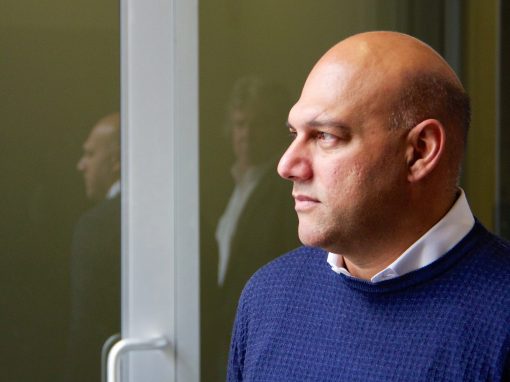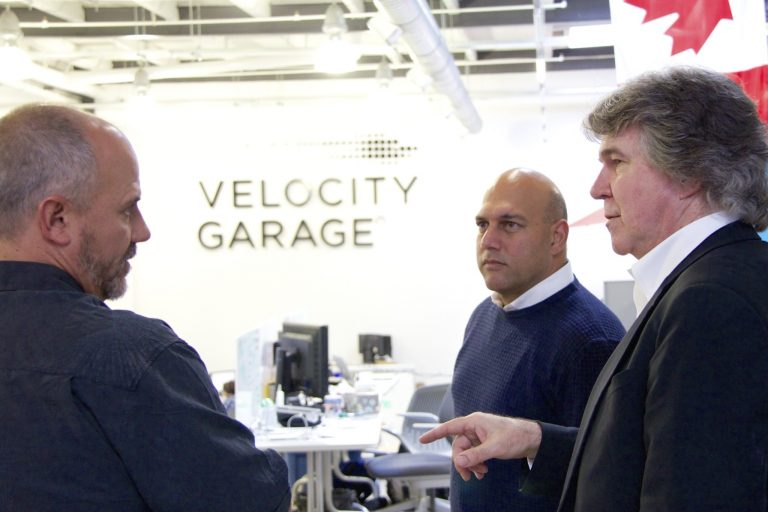Take 30 steps, each at a distance of one foot, and you’ll travel 30 feet.
Now imagine doubling the distance travelled with each of those 30 steps.
You’d travel 1,073,741,824 feet, equal to 8.2 trips around the Earth.
As any casual observer of technology can sense, human ingenuity has been accelerating our capabilities in a similar fashion, to the point where even the most stable-seeming industries are vulnerable to disruption.
And there are no keener observers of this phenomenon than the people behind Singularity University, the seven-year-old Silicon Valley institution co-founded by Ray Kurzweil and Peter Diamandis, where leaders learn “to apply exponential technologies to address humanity’s grand challenges.”

Salim Ismail: ‘The information comet has hit . . . the dinosaurs are
essentially extinct.’ (Communitech photo: Anthony Reinhart)
On Thursday, Salim Ismail – Singularity U’s founding Executive Director and Global Ambassador – returned to Waterloo Region, where he earned a degree in theoretical physics and computing at the University of Waterloo, to give a talk at the Accelerator Centre and tour the innovation ecosystem.
In addition to starting a few companies (one of which was acquired by Google) and heading up Yahoo’s internal “ideas factory” as a company VP, Ismail last year released Exponential Organizations, a book that examines how companies are adopting new models of operating as they move from an era of predictable, linear progress to one of accelerating change and disruption.
It had been 10 years since Ismail’s last visit – a decade of exponential advancement in Waterloo Region’s startup community – which came through in his observations during an afternoon visit to the Communitech Hub.
There, Ismail took a tour and then sat down for an intimate chat with a small but fast-growing group of big-company representatives who are heading up innovation labs in the Hub.
In a quick interview at the end of his visit, he shared a few thoughts on this era of exponential change, and his observations on a region that has seen quite a lot of it since he was last here.
Q – Tell me about the shortening lifespans of large companies, and why it’s happening.
A – The time it takes to reach a $1-billion market cap has been shrinking exponentially.
It used to take, like, 20 years to create a billion-dollar market. Google did it in eight years. Facebook took five years. Groupon got to a billion-dollar revenue runway in 18 months. It was unheard of until Grand Theft Auto did it in three days.
So, we’re seeing a very increased metabolism and volatility, and big companies are having definite difficulty keeping up.
Q – What does this say about how large companies have – or perhaps, haven’t –evolved to meet the reality of this new ‘exponential’ business environment?
A – It’s not that they’ve not evolved. It’s just that they’re all set up to manage predictability and manage stability; five-year plans etc.
But the information comet has hit, and to torture the metaphor, the dinosaurs are essentially extinct. They have to adapt and create the small, furry animals – which is essentially the equivalent of what you’ve got here – and let those start evolving. Otherwise, you have a big problem.
Q – So, as we move to managing disruption to managing predictability, what must large companies do if they expect to survive this shift?
A – The first thing is, keep the core organization the way it is. Don’t try and do massive disruption there, but take your disruptive change-makers to the edge and let them do something very disruptive there. And leave them alone; let them experiment at the edge.
And spin out new ideas into new business, and hopefully that becomes the new core.
Amazon Web Services is an example. This team started up, and that’s become a new core capability and a major line of business for Amazon.
Q – So the companies who are succeeding at this don’t try to bring the innovation back in, but they spin it out?
A – Right. Don’t bring it back in.
Q – How does Singularity University address these issues?
A – It’s very similar to the activators and the network and the facilities here. It’s almost an exact copy of what we’re doing.
We have corporate partners, where we have non-competing firms come in with a membership model. They come and plant people there, and we work with them, but they have access to our startups and our faculty.
It’s very similar to this, except our unique focus is accelerating technologies in this way.

Communitech CEO Iain Klugman (left) with Salim Ismail and David
Fransen (right), a University of Waterloo Special Advisor,
in uWaterloo’s Velocity Garage. (Communitech photo: Anthony Reinhart)
Q – You’re a Canadian and a University of Waterloo grad. What do you make of the tech community that has developed here since you were a student?
A – F---in’ hell, I wish I would have had access to this when I was a student. It’s fantastic. I think it’s great.
It’s the richest startup ecosystem I think I’ve ever seen. It’s richer than Silicon Valley in a funny way, because people are thinking about the systemic needs of the community, rather than ad-hoc things, like Y Combinator, popping up.
The companies come out of that and then they have nowhere easy to go.
And so, they either become big or they fold. Here, they have a chance to iterate a couple of times and go do something interesting.
That’s the positive side.
The negative side is, people need to be thinking globally and very ambitiously, and here I’m seeing people building features rather than products. They’re trying to do incremental improvements over the current state rather than breakthrough changes in the marketplace.
But it’ll happen. As the ecosystem matures, we’ll have people doing breakthrough and breakout thinking.
And what’s happening with IQC and the kind of thinking there, and the Perimeter Institute etc., will instigate that kind of thinking all over the community.
Q – You’ve just finished a tour of the Communitech Hub, where, among other things, large established companies have been docking with our startup ecosystem. What do you think of what we’re doing here?
A – I think it’s absolutely dead-on. And I say it’s absolutely dead-on from a bias, where we seem to have evolved into doing very, very similar things in Silicon Valley with our corporate partners.
Giving them a place where they can plant an innovation team safe from the mothership – I love the analogy they used, of having a 120-kilometre moat – that’s a great, great way of thinking about it.
And it’s really important, because that’s the only way you can really do disruptive thinking.
Q – Anything to add?
A – I’m absolutely thrilled to be back, and I’m so happy to see this type of evolution.

